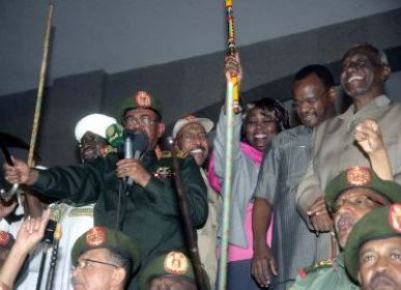Sudan to brief international community over Juba’s support to rebel groups
June 6, 2013 (KHARTOUM) – Sudan’s cabinet decided on Thursday to carry out a “broader diplomatic campaign” to brief the international community about the support that the neighbouring South Sudan provides to Sudanese rebel groups.

Bashir explain to his African counterparts, Sudan’s position on the violations of the matrix of cooperation agreements committed by the South Sudanese government and reaffirmed that Juba continues to support rebel movements to “carry out acts of terror and sabotage”, said the cabinet spokesperson Hatim Hassan Bakheit after the meeting.
According to Bakheit, the president added that Juba’s support to the rebel groups “is part of its strategic plan aiming to undermine Sudan’s capabilities and destabilise security and stability in the country”.
Sudan and South Sudan signed a timetable agreement last March to implement a number of agreements signed by Bashir and his South Sudanese counterpart Salva Kiir on 27 September 2012. However the two countries continue to trade accusations of support to rebel groups.
The two countries also continue to diverge over how to hold a referendum on self-determination in the disputed area of Abyei.
Khartoum believe that a lobby of South Sudanese officials including members in Juba government and leadership of security and intelligence services continue to support the rebels to get concessions from Sudan over their homeland of Abyei.
Kiir who is under international pressure to refrain from this alleged support accused Khartoum of holding Juba responsible of its own problems and denied backing the rebels.
Last Wednesday, the United Kingdom’s ambassador to the UN and UNSC, Mark Lyall Grant warned the two sides that that any support to rebel groups from both sides “is completely unacceptable and all the members of the Security Council are clear that should not happen”.
The coalition of rebel groups Sudanese Revolutionary Front (SRF) attacked last April different localities in Kordofan region as some 63,000 have been displaced by the clashes.
The rebels announced they plan for a bigger operation that might target different areas simultaneously as part of their war of attrition to bring down the regime.
Bashir warned after the taking back of Abu Kershola on 27 May that if Juba continues to support the rebels he will irreversibly shutdown oil pipelines allowing the exportation of South Sudanese oil to the international market.
Bakheit said the cabinet decided to conduct a campaign inside the country and to prepare the public opinion for such measures against South Sudan.
Last month the UN Security Council decided to hand over 1,200 soldiers to the United Nations Interim Security Force for Abuei (UNISFA) to participate in the monitoring operations on the common border between the two Sudans but seemingly the parties are moving again towards gloomy horizons.
(ST)
